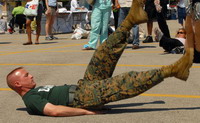Marine Corps unit not to leave Afghanistan after laid ambush
Marine Corps special forces involved in the shooting of civilians in Afghanistan last March responded appropriately to an ambush against them and should not have been pulled out of the country.

Marine Maj. Gen. Dennis J. Hejlik, head of Marine Corps Special Operations Command, also told reporters that a legal tribunal investigating the incident has been postponed until mid-January at the request of one of the officers involved.
"Obviously it was not my decision to bring the company out of theater," Hejlik said. "It was the theater commander's decision. I will never second guess the commander on the ground. I will say, I did not agree with it. To this day, I do not agree with it."
Eight members of the Marine Corps company involved in the March 4 shooting - which left as many as 19 civilians dead and 50 injured - were ordered back to Camp Lejune after the incident, and the rest of the company was told to leave Afghanistan and return to ships in the Persian Gulf.
Hejlik, however, stopped short of clearing the Marines of any blame in the incident, saying he could not speak to what may have happened after the initial ambush, when the unit was returning to their base.
A preliminary military investigation found that the Marines used excessive force and referred it for possible criminal inquiry. And Afghanistan's Independent Human Rights Commission said in a report that the troops fired indiscriminately at pedestrians and people in cars, buses and taxis in six different locations along a 10-mile stretch of road in Nangahar province after an explosives-rigged minivan crashed into their convoy.
In other comments, Hejlik said the creation of the new Marine Special Operations Command is moving along well. So far, he said, there are about 1,700 Marines in the special forces command, and he will reach the goal of 2,600 by late 2008.
The Marines formally entered the world of military special operations in February 2006, under the direction of then-Defense Secretary Donald H. Rumsfeld.
Hejlik said he expects the units to continue to work in Afghanistan, and also to concentrate their efforts in the Pentagon's new Africa Command that is being set up now. A key priority, he said, is to work with military from other nations, providing training and additional expertise.
Rumsfeld added Marines to the Pentagon's Special Operations Command because he said the military needed to continue to adapt to the tactics of terror networks such as al-Qaida, who use unconventional warfare to counter American firepower.
Subscribe to Pravda.Ru Telegram channel, Facebook, RSS!


